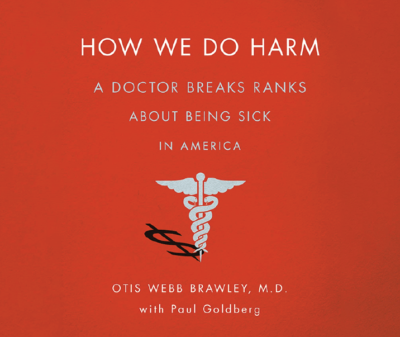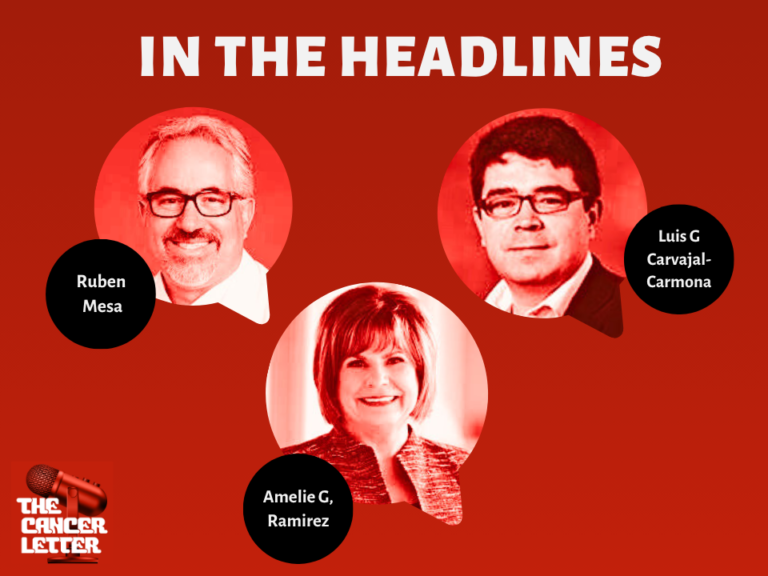UChicago Medicine Comprehensive Cancer Center has launched the Cancer Luminaries podcast series to mark its 50th year as a National Cancer Institute-designated center.
The second episode features a conversation with Otis Brawley, Bloomberg Distinguished Professor of Oncology and Epidemiology at the Johns Hopkins University Sidney Kimmel Comprehensive Cancer Center, and co-editor of the Cancer History Project.
Brawley earned his bachelor’s and medical degrees from UChicago.
Brawley spoke with Camilla Frost-Brewer, UChicago’s program manager for diversity, equity, and inclusion, about how to reduce deaths from cancer, his work to combat health disparities, and his time at UChicago, including learning from two “pillars of oncology”: John Ultmann (The Cancer Letter, Oct. 27, 2000) and Harvey Golomb.
The podcast recording and transcript of this interview are now available on the Cancer History Project:


Cancer Luminaries Podcast: Dr. Otis Brawley Talks about Cancer Disparities as Barriers to Better Outcomes for All
By University of Chicago Medicine Comprehensive Cancer Center, May 1, 2024
The UChicago Medicine Comprehensive Cancer Center (UCCCC) is excited to share with you a special project we have been working on to celebrate the 50th anniversary of receiving National Cancer Institute designation in 1973.
I had always been interested in science and policy, and [John Ultmann] convinced me that there was a lot of policy in oncology, and there’s a lot of good science in oncology.
Otis W. Brawley
We have launched a podcast series titled Cancer Luminaries, which highlights alumni, previous faculty, and past leaders who have engaged with the UCCCC. In each episode, these Cancer Luminaries will reflect on their tenure at UChicago, share stories about significant people and discoveries made here, and discuss the history and future of cancer care and research at our institution.
We invite you to tune in once a month to hear these insightful conversations. Episode two features alumni star and nationally renowned cancer disparities researcher Otis W. Brawley, SB’81, MD’85, the Bloomberg Distinguished Professor of Oncology and Epidemiology at Johns Hopkins University. He recounts his “Forrest Gump existence,” where he was in the room when big moments happened. Dr. Brawley grew up in Detroit and completed undergraduate and medical training at the University of Chicago, where he says he met giants of cancer, Dr. John Ultmann and Dr. Harvey Golomb. These early experiences with mentors set the course for Dr. Brawley’s career where he has been able to make a difference in improving outcomes for cancer patients through his research, advocacy, and mentorship of young cancer researchers from underrepresented backgrounds.
Related articles


How We Do Harm: Chapter 1, “Chief Complaint”
By Otis Brawley, with Paul Goldberg, Feb. 10, 2023
The following is an excerpt from How We Do Harm: A Doctor Breaks Ranks About Being Sick in America, by Otis W. Brawley, MD, with Paul Goldberg, published in 2012.
SHE WALKS THROUGH the emergency-room doors sometime in the early morning. In a plastic bag, she carries an object wrapped in a moist towel.
She is not bleeding. She is not in shock. Her vital signs are okay. There is no reason to think that she will collapse on the spot. Since she is not truly an emergency patient, she is triaged to the back of the line, and other folks, those in immediate distress, get in for treatment ahead of her. She waits on a gurney in a cavernous, green hallway.
The “chief complaint” on her chart at Grady Memorial Hospital, in downtown Atlanta, might have set off a wave of nausea at a hospital in a white suburb or almost any place in the civilized world. It reads, “My breast has fallen off. Can you reattach it?”
She waits for at least four hours—likely, five or six. The triage nurse doesn’t seek to determine the whereabouts of the breast.
Obviously, the breast is in the bag.
Read the full chapter on the Cancer History Project.


Video: Otis Brawley & Robert Winn discuss the killing of Tyre Nichols and the power dynamics in policing—and health care
By The Cancer Letter, Feb. 3, 2023
On May 25, 2020, George Floyd said “I can’t breathe” more than 20 times before he suffocated on a street in Minneapolis. On Jan. 7, 2023, Tyre Nichols repeatedly screamed, “Mom, mom, mom” as he was beaten to death on a street in Memphis.
Both were Black men. Both died at the hands of police officers wielding the power of life and death.
“This is like déjà vu all over again. That’s only two years ago,” said Robert Winn, director and Lipman Chair in Oncology at the Virginia Commonwealth University Massey Cancer Center, a professor of pulmonary disease and critical care medicine at the VCU School of Medicine, and the guest editor of The Cancer Letter during February, Black History Month.
“It’s a cultural problem. It’s some kind of bias. It’s a disrespect,” said Otis Brawley, Bloomberg Distinguished Professor of Oncology and Epidemiology at Johns Hopkins University, and co-editor of the Cancer History Project.
Both physicians have had life-threatening encounters with police—Brawley was thrown to the ground and held at gunpoint for standing in the garage of his own home; Winn was thrown to the ground and held at gunpoint for walking toward his own car.
“We both happen to be Black men. With the events in the last several weeks involving Tyre Nichols in Memphis, we thought we should have a chat, because both of us have in the past talked about our experiences with police, our experiences in society growing up,” Brawley said.
The Cancer Letter invited Winn and Brawley to discuss the structural biases and racism in law enforcement as well as in health care.
This column features the latest posts to the Cancer History Project by our growing list of contributors.
The Cancer History Project is a free, web-based, collaborative resource intended to mark the 50th anniversary of the National Cancer Act and designed to continue in perpetuity. The objective is to assemble a robust collection of historical documents and make them freely available.
Access to the Cancer History Project is open to the public at CancerHistoryProject.com. You can also follow us on Twitter at @CancerHistProj, or follow our podcast.
Is your institution a contributor to the Cancer History Project? Eligible institutions include cancer centers, advocacy groups, professional societies, pharmaceutical companies, and key organizations in oncology.
To apply to become a contributor, please contact admin@cancerhistoryproject.com.







